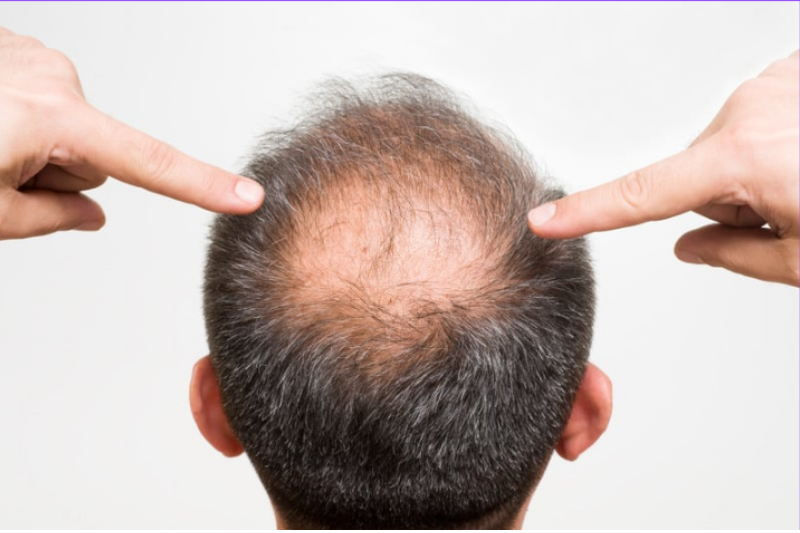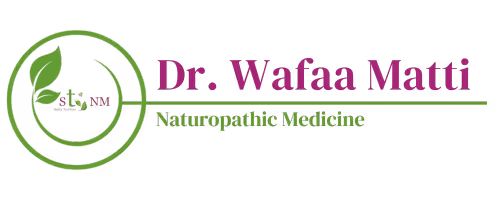
For many men, hair isn’t just about appearance — it’s tied to confidence, identity, and self-esteem. When hair begins to thin or recede, it can bring feelings of frustration or even anxiety. You’re not alone — male pattern baldness (androgenetic alopecia) is the most common cause of hair loss, affecting more than 50% of men by age 50 according to the National Institutes of Health.
The good news? You don’t have to rely solely on harsh chemicals or invasive surgery to address it. Learn how natural, evidence-based, and regenerative therapies can help restore hair and confidence—without compromising your health.
At Dr. Wafaa Matti’s naturopathic practice in Encinitas, California, hair restoration is approached differently. Rather than focusing only on symptoms, Dr. Matti looks at the root causes of hair loss through a holistic and functional lens — addressing hormonal balance, inflammation, nutrient status, and lifestyle habits that affect scalp and follicle health.
The Root Cause: Why Male Pattern Baldness Happens
Hormonal Factors
The main hormone involved in male pattern baldness is DHT (dihydrotestosterone), a byproduct of testosterone. DHT binds to hair follicles, gradually shrinking them — a process known as follicle miniaturization — which leads to thinning and eventual hair loss. When the hormonal balance shifts or the scalp becomes overly sensitive to DHT, hair growth slows and weakens.
Genetic Predisposition
Genetics play a strong role. If baldness runs in your family, you may have inherited a higher sensitivity to DHT or other hormonal triggers. However, genes alone don’t seal your fate — epigenetic factors like diet, stress, and inflammation can influence how these genes express themselves.
Lifestyle & Environmental Factors
Modern living adds layers of stress that can accelerate hair loss. Chronic stress, poor sleep, nutrient deficiencies (especially iron, zinc, and vitamin D), and toxin exposure from plastics or pollutants all contribute to inflammation that damages follicles. Diets high in processed foods, alcohol, and sugar can also raise cortisol and insulin, further disrupting hair-supporting hormones.
The Holistic Insight
In naturopathic medicine, hair loss is viewed as a sign of internal imbalance rather than just a cosmetic concern. Dr. Matti follows the principle of Tolle totum — “Treat the Whole Person.” She investigates not just the scalp but also what’s happening inside: Are hormones in balance? Is digestion absorbing nutrients properly? Is chronic stress driving inflammation? When these underlying causes are corrected, the body’s natural healing and regenerative mechanisms can restore stronger, healthier hair growth.
Conventional vs. Holistic Approaches
Conventional Treatments
Pharmaceutical options like minoxidil and finasteride are widely used. Minoxidil works by improving scalp blood flow, while finasteride blocks DHT conversion. Though they can help, both may cause unwanted side effects such as scalp irritation, decreased libido, or hormonal imbalances. Hair transplants, though effective for some, are costly and invasive — and they don’t address the why behind the hair loss.
The Holistic Perspective
Instead of masking symptoms, holistic medicine focuses on restoring the body’s healing intelligence. Dr. Matti combines regenerative techniques like Platelet-Rich Plasma (PRP) therapy and microneedling with nutrition, hormone balance, and stress management to support natural follicle regeneration. These methods activate the scalp’s natural repair pathways, encouraging your own body to do the healing.
Functional Medicine Integration
Every patient’s hair loss story is unique. That’s why Dr. Matti begins with comprehensive functional lab testing to uncover underlying contributors — thyroid dysfunction, testosterone imbalance, adrenal fatigue, or micronutrient depletion. Once these are identified, a customized plan is developed that supports both scalp and systemic health. The result? Longer-lasting, more sustainable results that work with your body, not against it.
Natural & Regenerative Therapies That Show Results
Platelet-Rich Plasma (PRP) Therapy
PRP therapy uses your body’s own healing power to rejuvenate thinning areas of the scalp. A small sample of your blood is drawn and processed to separate the platelet-rich plasma, which contains concentrated growth factors responsible for tissue repair and regeneration.
When this golden plasma is gently injected into the scalp, it releases growth factors such as platelet-derived growth factor (PDGF) and vascular endothelial growth factor (VEGF). These compounds stimulate dormant hair follicles, improve blood flow, and strengthen the hair growth cycle.
Research published in the Journal of Cutaneous and Aesthetic Surgery and on PubMed shows that PRP therapy significantly increases hair density and thickness in men with androgenetic alopecia. A 2023 Mayo Clinic Proceedings review found that PRP is a safe, minimally invasive, and effective option for stimulating new hair growth without systemic side effects (Mayo Clinic, 2023).
At Dr. Wafaa Matti’s Encinitas office, PRP therapy is performed using a gentle and precise technique. She often combines PRP with microneedling to enhance scalp oxygenation and collagen synthesis. This synergistic approach helps awaken inactive follicles and naturally strengthen existing strands—without harsh chemicals or downtime.
Microneedling for Hair Regeneration
Microneedling creates microscopic channels in the scalp, triggering the body’s natural healing response. This process boosts collagen production and encourages growth factor release, providing a healthy environment for follicles to thrive.
When paired with PRP or plant-based growth serums, microneedling allows these regenerative substances to penetrate more deeply into the scalp. The result is improved hair texture, thickness, and overall scalp vitality. Studies from the International Journal of Trichology have shown that microneedling enhances the effectiveness of topical and injectable therapies in men with androgenetic alopecia.
Botanical & Nutritional Support
Your diet and supplement routine play a vital role in supporting strong, resilient hair. Nature offers several clinically backed remedies that can complement regenerative treatments.
Botanicals That Help Block DHT:
- Saw Palmetto: Acts as a natural 5-alpha-reductase inhibitor, reducing DHT buildup at the follicle level.
- Pumpkin Seed Oil: In a 24-week clinical trial (Evidence-Based Complementary and Alternative Medicine), men taking pumpkin seed oil showed a 40% increase in hair count compared to placebo.
- Nettle Root & Rosemary Oil: Help reduce inflammation and increase scalp circulation.
Nutrients Essential for Hair Growth:
- Biotin (Vitamin B7) – strengthens keratin structure.
- Zinc & Iron – support cellular repair and oxygen delivery to follicles.
- Vitamin D – regulates hair cycling and immune balance.
- Omega-3 fatty acids – calm inflammation and nourish the scalp.
According to the NIH Office of Dietary Supplements, deficiencies in these nutrients can directly impact hair follicle health and regrowth potential.
Hormone & Metabolic Balance
Your hormones are powerful messengers that influence hair density and quality. Imbalances in testosterone, thyroid, insulin, or cortisol can accelerate shedding and weaken new growth.
Dr. Matti uses functional testing to assess thyroid panels, testosterone metabolism, and adrenal performance. Through individualized hormone optimization, including support for thyroid and adrenal function, she helps restore balance naturally. This may include lifestyle modification, targeted nutrient therapy, and, when appropriate, gentle bioidentical hormone support — always monitored closely and tailored to each patient’s physiology.
Lifestyle Medicine for Long-Term Hair Health
Hair health reflects overall wellness. By caring for the body’s internal environment, you create the foundation for sustainable regrowth.
- Stress Reduction: Chronic stress raises cortisol, which shortens the hair growth phase. Dr. Matti emphasizes mindfulness, deep breathing, and restorative sleep as essential parts of any hair restoration plan.
- Diet for Hair Health: The Mediterranean-style diet—rich in olive oil, fatty fish, leafy greens, nuts, and colorful vegetables—has been linked to reduced inflammation and improved hair density in men.
- Toxin Reduction: Avoiding endocrine disruptors (found in plastics, synthetic fragrances, and pesticides), minimizing alcohol, and quitting smoking can dramatically improve scalp circulation and hormone balance.
Reclaim Your Confidence — Naturally
Hair loss doesn’t have to be a lifelong struggle. With the right blend of science, naturopathic medicine, and regenerative therapies, you can support your body’s innate ability to heal and grow stronger, healthier hair.
Dr. Wafaa Matti’s holistic approach helps men move beyond temporary fixes — uncovering the root causes of thinning, restoring hormonal balance, and revitalizing scalp health through gentle, evidence-based care.
You don’t have to accept hair loss as inevitable — your body can heal when supported correctly.
Take the Next Step Toward Restoring Your Hair and Confidence
📞 Schedule a consultation with Dr. Wafaa Matti to explore your personalized hair restoration plan.
🌿 Location: Stengler Center for Integrative Medicine
324 Encinitas Blvd, Encinitas, CA 92024
📧 Email: clinic@drwafaamatti.com
🌐 Website: drwafaamatti.com
📱 Phone: 760-274-2377
💬 Connect with Dr. Matti:
Instagram | Facebook | LinkedIn | YouTube
.svg)
Explore Our Latest Insights
Discover tips for better digestive health.
Ready to Take the Next Step?
Reach out today to schedule your visit or ask a question—Dr. Wafaa’s team is here to support your wellness journey, both in person and online.


